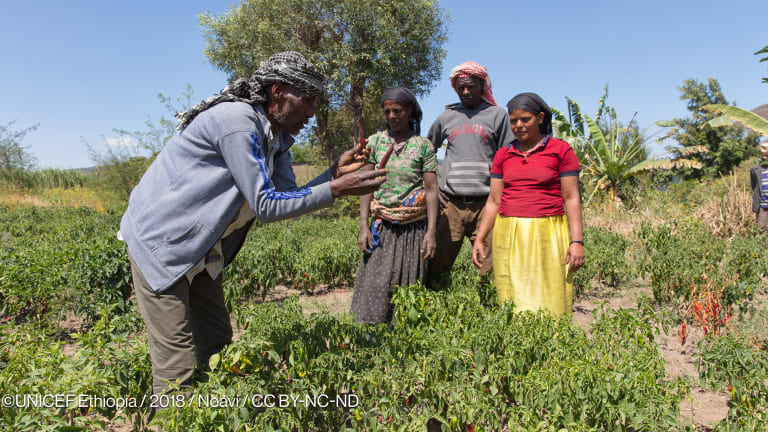
Food systems are a sustainable development paradox. While our carbon-intensive and hugely inequitable global food systems act as a driver of multiple crises, they could also be the catalyst for the most impactful solutions that will help us to achieve the 2030 Agenda and the Sustainable Development Goals.
Some 828 million people, or 1 in 9, go to bed hungry every night. At the same time, 931 million tons of food, or 17% of the total food available to consumers, goes to waste. Food loss and waste are estimated to account for 8-10% of greenhouse gas emissions, exacerbating climate change, pollution, and biodiversity loss.
The interplay between climate, food, and health is evident. According to the United Nations Food and Agriculture Organization, FAO, 3.1 billion people worldwide cannot afford a healthy diet, contributing to a growing burden of premature diseases worldwide. Meanwhile, the changing climate is already negatively impacting crop yields, spelling problems for further undernourishment, and access to healthy diets in the years to come.
In addition, COVID-19 has exacerbated global food inequalities: the prevalence of undernourishment increased by 1.5% to 9.9% in 2020. The war in Ukraine, meanwhile, has intensified pressure and exposed gaps in agri-food systems, as the world painfully learned about the vitality of both countries as net exporters of agricultural products, and the vulnerability of these markets to shocks.
From this woeful scenario, it is evident that much more must be done to connect the dots between several themes within the planetary health scope. In my book “Breaking the Silos for Planetary Health: A Roadmap for a Resilient Post-Pandemic World”, I showed critical synergies between public health and sustainability. Yet, in the world of policymakers, these areas remain concerningly disconnected with severe implications for the most vulnerable populations.
Recommendations for a healthier future
Given the growing geopolitical tensions after the war in Ukraine and the negative effects of climate change, such as deadly floods and droughts worldwide, countries can no longer afford to jump from crisis to crisis. Therefore, three recommendations should be highlighted when planning for a healthier future.
First, policymakers must prioritize sectors that require system-wide investments — transforming current food systems is proving to be one of the most promising strategies to put the SDGs back on track. Food production is responsible for a third of all global warming emissions. Yet, very few countries consider healthier diets as part of their portfolio of solutions in their Nationally Determined Contributions.
Second, health and sustainability professionals have much to contribute by advocating for human health through an environmental lens. Strengthening collaboration among individuals and organizations working in public health and sustainability solidifies the message that well-functioning ecosystems are vital to protect human health. For example, as of November 2022, a total of 59 countries have committed at the minister of health level to more ambitious climate action within health systems. These actions must be scaled and supported by multidisciplinary teams.
Thirdly, the whole of society has a role to play by redesigning social contracts and structures that are more equitable. Gender inequality remains one of the most noticeable structural injustices with adverse health and environmental implications. As founder of the network Women Leaders for Planetary Health, I urgently call for further understanding and acknowledgement of the role of gender equality as an accelerator of planetary health solutions, especially in low- and middle-income countries. To increase our chances of leaving the current crises behind, we must tap into our collective intelligence and invest in more diverse decision-making. Food systems transformation cannot remain gender-blind and should instead ensure women are further included in decision-making, that opportunities for women are expanded, and women’s networks are encouraged and supported globally, among other recommendations.
Global solutions
The urgency of food system transformation is irrefutable. But no country alone can drive the needed change at scale. National plans must be coordinated with global solutions that prioritize the planetary health vision. One promising space for driving change has been created by the 2021 U.N. Food Systems Summit. Led by the U.N. Secretary-General António Guterres, the summit attested to both the urgency and the political will to do better regarding what we put on our plates. Overall, 163 countries made statements regarding the importance of food systems in advancing the 2030 Agenda.
Since the summit, 148 countries appointed Convenors to lead national dialogues, and 117 have submitted National Pathways for food systems transformation that offers a basis for realizing the changes needed at the country level. In this process, ministerial and national statements from the U.N. member states showed a commitment to more resilient food systems.
The summit also led to the launch of the U.N. Food Systems Coordination Hub, which is focused on systemic, country-driven, and customized support to help food system transformation. Global thought leaders are invited by the hub to join in and help unite social movements across health and climate, and turn this work into concrete commitments.
Cost of inaction
Finally, amid costs of living crises, many high-income countries risk focusing on their own economic woes. However, disregarding the inherent global interdependence that is characteristic of the Anthropocene would be an expensive mistake. To drive positive change, policymakers must become smarter with our finances. Taxpayer money can no longer be used to increase pollution and fund industries that are hazardous to our health and environment.
By connecting the dots between how we produce, process and consume our food, $12 trillion a year in hidden costs to the environment and human health could be saved and reinvested in long-term policies. More than just providing sustenance to ourselves, transformative food systems will nourish the world.
Visit the Planet Health series for more in-depth reporting on the current impact of the climate crisis on human health around the world. Join the conversation by using the hashtag #PlanetHealth.









